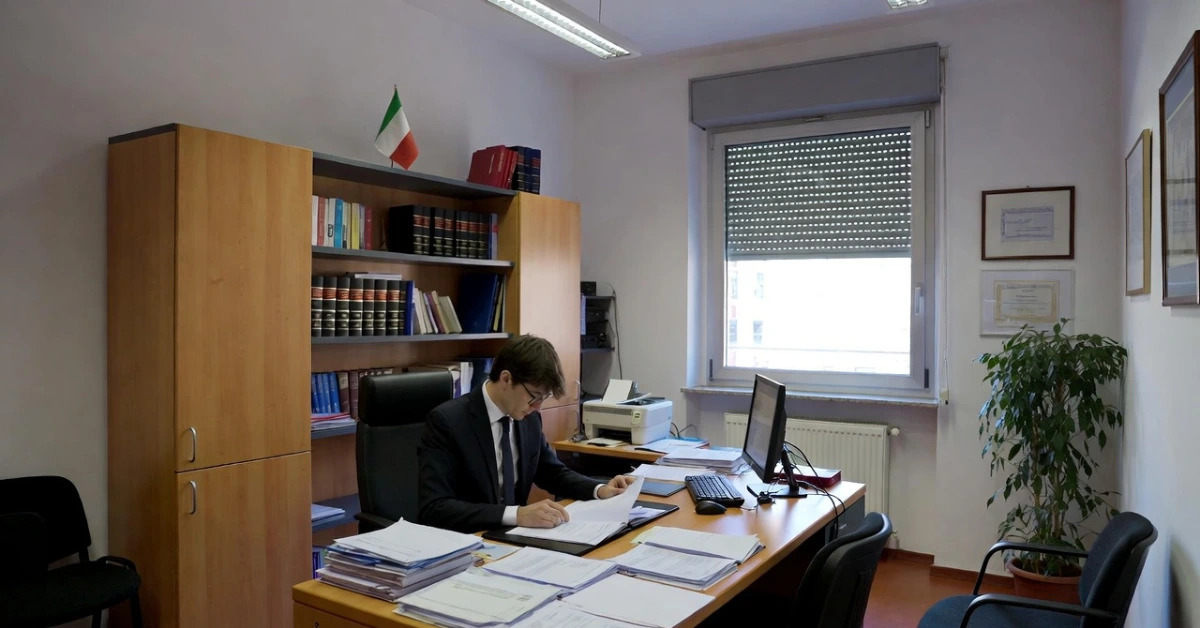If you’re a non-EU citizen in a serious relationship with an Italian or EU national, you may be eligible for a residence permit for cohabitation. This permit allows you to live legally in Italy with your partner, even if you’re not married. It also gives you access to work opportunities, healthcare, and various financial benefits.
Table of Contents
ToggleWhat Is a Residence Permit for Cohabitation?
The residence permit for cohabitation is designed for unmarried partners who can prove they have a stable, long-term relationship similar to marriage. It recognizes your right to live together legally in Italy.
This right is based on EU Directive 2004/38/EC and Italian Legislative Decree 30/2007, which extends family reunification rights to non-EU partners of EU citizens. In Italy, Law 76/2016 (known as the Cirinnà Act) officially recognized both civil unions and cohabitation agreements (contratti di convivenza). These laws give unmarried couples many of the same legal protections as married spouses.
In practice, this means that if you and your partner live together and can show evidence of your relationship, such as joint residence, shared bills, or a registered cohabitation agreement, you can apply for this permit and enjoy most of the same rights as married couples in Italy.
Fiscal and Financial Benefits of Cohabitation
Obtaining a residence permit for cohabitation brings substantial fiscal and financial advantages that make it an attractive option for binational couples.
Tax Benefits and Fiscal Residence
Once registered as cohabitants, both partners can benefit from Italy’s tax system as residents.
You become a fiscal resident (residente fiscale) if you:
- Live in Italy for more than 183 days a year
- Have your main residence in Italy
- Have your primary economic interests in Italy
As a fiscal resident, you’ll pay taxes on your worldwide income but also gain access to key tax deductions and credits available to residents.
Healthcare Access
One of the most significant financial benefits is access to Italy’s national healthcare system (Servizio Sanitario Nazionale – SSN). With a residence permit based on cohabitation, the non-EU partner can register with the SSN, gaining access to public healthcare services at minimal cost.
To register with the SSN, you’ll visit your local health authority (ASL – Azienda Sanitaria Locale) with your residence permit, tax code (codice fiscale), and proof of residence.
Once registered, you’ll receive a health card (tessera sanitaria) and can choose a general practitioner (medico di base) at no cost. You’ll pay only small co-payments (ticket sanitari) for certain services, typically ranging from 0 to 36 euros depending on the service and your income level.
Benefits include:
- Registration with the local health authority (ASL)
- Access to a personal general practitioner (medico di base)
- Low co-payments (€0–€36) depending on income and service
- Comprehensive public healthcare: doctor visits, hospital care, prescriptions, maternity care, and more
This eliminates the need for private health insurance, which typically costs €1,000–€3,000.
Work Rights and Income Opportunities
The residence permit for cohabitation is valid for five years and allows the holder to:
- Work in Italy without restrictions
- Start a business or freelance
- Contribute to the household income
No separate work authorization is required.
Property and Inheritance Rights
Registered cohabitants in Italy gain important property rights under Law 76/2016. Both partners can jointly own property, and the cohabitation agreement provides legal protection for shared assets.
If your partner makes a will (testamento), they can leave you property or assets, though they must still respect the mandatory shares (quota legittima) reserved for certain family members like children or parents under Italian forced heirship rules. Many couples create wills specifically to protect each other financially.
For tax purposes, cohabitants don’t receive the same favorable inheritance tax rates as spouses (who are exempt), but you can still inherit with proper planning. Inheritance tax (imposta di successione) for cohabitants is calculated at the general rate of 8% on amounts exceeding 1 million euros, rather than the spousal exemption.
Social Security and Pension Benefits
As a legal resident with work rights, the non-EU partner can contribute to Italy’s social security system (INPS – Istituto Nazionale della Previdenza Sociale) and build pension rights. This long-term financial benefit is crucial for retirement planning and provides access to various social protections.
When you work in Italy, both you and your employer contribute to social security. For employees, approximately 9.19% of your gross salary goes to pension contributions, while your employer contributes roughly 33%. These contributions count toward your future pension (pensione di vecchiaia), which you can typically claim at age 67 with at least 20 years of contributions.
Unemployment
Beyond pension rights, social security contributions give you access to unemployment benefits (Naspi – Nuova Assicurazione Sociale per l’Impiego) if you lose your job involuntarily. You can receive up to 75% of your average salary for a maximum of 24 months, depending on your contribution history.
Maternity and paternity benefits are also available. Women can receive 80% of their salary for five months around childbirth (two months before and three months after, or one month before and four months after). Fathers are entitled to ten days of paid paternity leave. Both parents can also take additional parental leave (congedo parentale) with partial pay.
If you become ill or injured, you’re entitled to sickness benefits (indennità di malattia) paying 50% of your salary for the first 20 days and 66.66% thereafter, up to 180 days per year. These protections provide significant financial security that isn’t available to those without legal residence status.

Eligibility Requirements
To qualify for a residence permit for cohabitation, both partners must meet specific criteria established by Italian law.
Relationship Requirements
The couple must demonstrate a stable, long-term relationship. While there’s no specific duration required, authorities look for evidence of genuine commitment. The relationship should be exclusive and similar in nature to marriage.
Current Legal Status
The non-EU partner must already hold a valid residence permit for Italy. This could be a work permit, a student visa, or a residence permit as a family member of an EU citizen issued by another EU member state. This requirement ensures the applicant is already legally present in the country.
Shared Residence
Both partners must live together at the same address and be registered as residents (residenza anagrafica) in the same municipality. This shared residency must be verifiable through official documentation from the local registry office (anagrafe).
Age Requirement
Both partners must be at least 18 years old, though some municipalities may apply the standard family reunification age requirement of 21 years.
Income Requirements
The couple must demonstrate sufficient financial resources to support themselves. The minimum annual gross income requirement is typically 11,000 euros for the first family member, increased by approximately 3,500 euros for each additional dependent. Importantly, both partners’ income counts toward meeting this threshold, making it easier for couples to qualify.
Healthcare Coverage
The applicant must have access to healthcare, either through registration with the Italian national health service or private health insurance covering themselves and any dependents.
Applicable Nationalities
This procedure applies to partners of citizens from EU member states, as well as nationals of Iceland, Liechtenstein, Norway, Switzerland, and San Marino.
Required Documentation
Preparing the correct documents is crucial for a successful application. Here’s what you’ll need:
Identity Documents
Valid passports or travel documents for both partners, along with copies of all pages. The EU nationals should provide their identity card or passport.
Proof of Relationship
Documentation demonstrating your stable relationship may include:
- Joint bank account statements
- Rental or property contracts in both names
- Utility bills showing both names at the same address
- Correspondence addressed to both partners at the same address
- Photos together over time
- Witness statements from family or friends
Cohabitation Registration
A certificate of registration (certificato di convivenza) from the municipality’s special register for cohabitants (registro delle unioni civili or anagrafe). This is obtained by submitting a cohabitation declaration (dichiarazione di convivenza) to your local registry office.
Proof of Residence
Certificato di residenza showing both partners registered at the same address, along with your rental contract or property deed.
Financial Documentation
- Recent pay slips
- Employment contracts
- Bank statements showing regular income
- Tax returns (dichiarazione dei redditi)
- CUD or Certificazione Unica documents
If self-employed, provide business registration documents and income statements.
Healthcare Documentation
Proof of healthcare coverage, such as SSN registration (tessera sanitaria) or a valid private health insurance policy
Current Residence Permit
A valid copy of the non-EU partner’s existing residence permit
Additional Documents
- Completed application forms
- Passport-sized photographs
- Proof of payment for application fees
- If previously married: divorce certificates or death certificates of former spouses
Important: All foreign documents must be officially translated into Italian by a certified translator and authenticated with an apostille or through the relevant embassy or consulate.
The Application Process
To apply for a cohabitation permit in Italy, you’ll simply need to follow six basic steps.
Step 1: Municipal Registration
Visit your local registry office (ufficio anagrafe) to register your cohabitation. Both partners must appear in person with identity documents and proof of shared residence. You’ll sign a cohabitation declaration, and the municipality will register you in the cohabitants’ register.
Step 2: Document Preparation
Gather all required documents, ensuring everything is properly translated and authenticated. This stage often takes the longest, especially if documents must be obtained from abroad.
Step 3: Submit Application
Submit your application for a residence permit as a family member of an EU citizen at the local immigration office (Sportello Unico per l’Immigrazione) or police headquarters (Questura). Some municipalities allow online pre-submission through their websites.
Step 4: Biometric Appointment
Attend your scheduled appointment at the Questura to provide fingerprints and submit original documents for verification. Bring all originals corresponding to the copies submitted.
Step 5: Wait for Processing
The average processing time is two to three months from the application date. During this period, authorities may request additional documentation or clarification.
Step 6: Collect Your Permit
Once approved, you’ll receive a notification to collect your residence card. This five-year permit allows you to live and work throughout Italy.
Financial Rights and Obligations
With your residence permit for cohabitation comes a set of financial rights and obligations you should understand.
Rights
You gain the right to:
- Work without restrictions
- Access banking services and credit facilities on equal terms with citizens
- Own property individually or jointly
- Establish and run businesses
- Access social services and benefits
- Contribute to and benefit from the social security system
Obligations
You must:
- Maintain sufficient income to support yourself
- Pay Italian taxes on worldwide income as a fiscal resident
- Maintain valid healthcare coverage
- Renew your residence permit before expiration
- Notify authorities of changes in address or civil status
The Italian State Council (Consiglio di Stato), in ruling No. 5040 of October 31, 2017, determined that current legislation on residence permits allows for family reunification permits to be issued to cohabiting foreign partners of Italian citizens, even though the law hasn’t been fully updated to reflect the reforms of Law 76/2016.
Working with an immigration lawyer experienced in cohabitation cases can significantly improve your chances of success, particularly if judicial proceedings become necessary. Law firms specializing in this area have successfully obtained permits for numerous binational couples through administrative appeals and court actions.
Would you like to read more about similar subjects? Take a look at our related articles here: Italian Golden Visa, Bring Pets to Italy and Benefits of Small Municipalities in Italy.
Residence Permit for Cohabitation – Survey
1. What is the main purpose of a residence permit for cohabitation in Italy?
To allow unmarried partners to live together legallyTo obtain Italian citizenship
To register a business in Italy
2. Which EU Directive forms the legal basis for the residence permit for cohabitation?
Directive 2004/38/ECDirective 2016/97/EU
Directive 2007/30/EC
3. What law in Italy officially recognized civil unions and cohabitation agreements?
Law 90/2015Law 76/2016 (Cirinnà Act)
Law 132/2014
4. How long must you live in Italy to become a fiscal resident?
More than 90 days per yearMore than 183 days per year
More than 365 days per year
5. Which of the following benefits does the residence permit for cohabitation provide?
Free housingAccess to Italy’s public healthcare system (SSN)
Automatic pension approval
6. How long is the residence permit for cohabitation typically valid?
One yearThree years
Five years
7. What is the minimum annual gross income required for a couple to qualify?
About €5,000About €11,000
About €20,000
8. Which document proves that both partners live at the same address?
Certificato di residenzaCodice fiscale
Tessera sanitaria
9. Where is the application for the residence permit submitted?
Local immigration office (Sportello Unico) or QuesturaItalian embassy abroad
Ministry of Economy and Finance
10. What key right does the residence permit guarantee to the non-EU partner?
Free university educationThe right to work in Italy without restrictions
Automatic citizenship after 2 years




